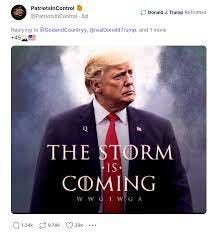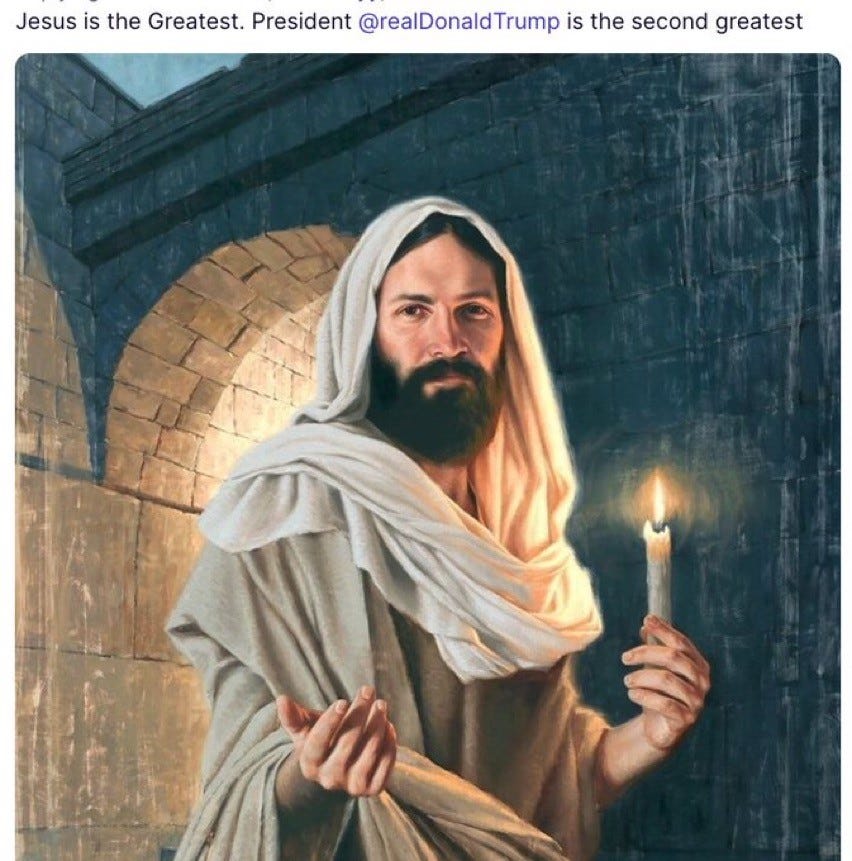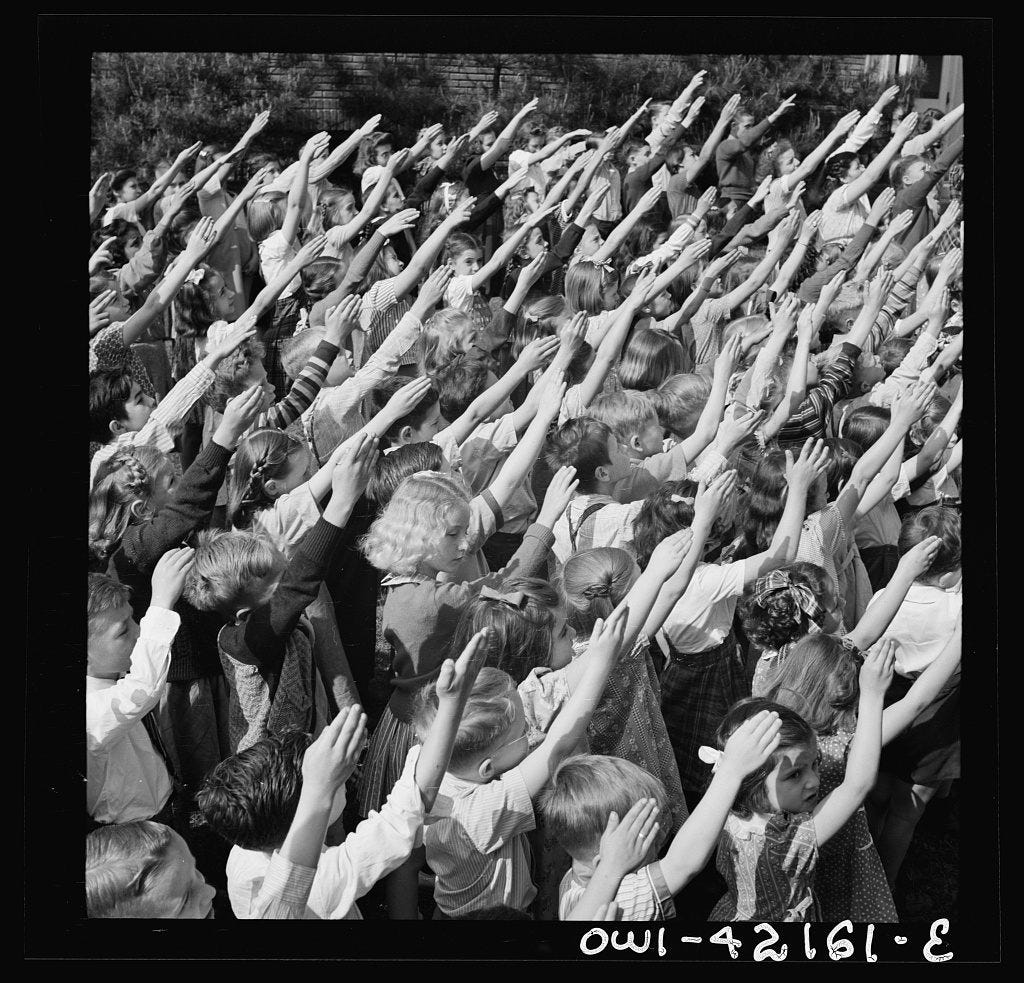Should Journalists Cover QAnon as Trump’s New Religion?
Taking messianic claims seriously could be a helpful frame.
Welcome to Second Rough Draft, a newsletter about journalism in our time, how it (often its business) is evolving, and the challenges it faces.
QAnon was one thing when, as Wikipedia says, it was a “political conspiracy theory” growing out of crazy nonsense about pedophiles in the basement of a pizzeria. But now that it has been adopted by Donald Trump, who sports its logo in his lapel on photos he circulates, plays its hymn at his rallies and accepts the pointed-finger right-armed salute of some of its adherents, I think we need to think about it, and cover it, quite differently.
Many say we should approach it as a “cult,” but I don’t think that’s the right analytic frame, as it misses the involvement of a possible candidate for president of a major political party.
Bear with me on this for a few minutes, as it may initially make your head explode: I wonder if journalists might be better served if we approached QAnon as a new religion, and Trump as its supposed Messiah. It is a role many in QAnon have suggested, and one Trump, with his recent behavior, seems to have adopted. (Just in case you think I have overreached, here are stories from Politico, Time, PBS and NPR all noting the messianic role of Trump in QAnon thought.)
Thinking about, and writing about, QAnon as a religion and Trump as accepting his designation as Messiah actually could help guide us not only in coverage, but in delimiting what is acceptable and what is unacceptable in the movement.
The limits of religion
What’s acceptable is that people have a right, under the First Amendment guarantee of free speech and a free press, to believe in and advocate for myths. Each of our major faiths, for instance, respects the right of the adherents of the others to what it regards as such myths. But that doesn’t entitle believers to pursue those myths as the basis for violence, or to limit the rights of others.
What’s acceptable is that people have a right, under the free exercise of religion clause of the same amendment, to believe that Trump is the Messiah (and he has the right to concur). What’s not acceptable is to insist that others share this belief, or to attempt to impose it on the rest of us (that’s the other constitutional religion clause), or to maintain that these particular beliefs are superior to our laws, whether the laws governing elections or classified information or those forbidding violent crime or anything else.
In short, thinking about Trump and QAnon in this way at once promotes empathy where that’s appropriate and resistance where it’s required.
I am not suggesting that all coverage of Trump should be framed this way. The Trump story should not be confined to religion in 2022 and 2023 any more than it should have been to the entertainment section in 2015. A number of Trump’s activities are purely secular: his business’s tax fraud and his misappropriation of government documents are examples. But the larger context of his larger claims do seem to require some new thinking from the press.
What history teaches us
Covering Trump as a would-be religious figure would, it seems to me, respect history, in this country and around the world. Around two hundred years ago, a young man in New York state named Joseph Smith proclaimed a new religion, of which the nearly 17 million Mormons today regard him as a prophet. That faith was often met with violence, and was later responsible for some violence of its own. For decades after the Mormons had migrated to Utah, that territory’s admission to the Union was refused, until the Church agreed to renounce a prominent aspect of its faith (polygamy). Today, Mitt Romney, the most prominent Mormon politician in our country’s history, is one of the leading defenders of democracy among both Republicans and conservatives.
A less benign, and at least equally instructive bit of history can be seen in the interplay between 20th Century fascism in first Italy and then Germany (with their four-fingered right-arm salutes) and the Catholic Church, especially as outlined in two excellent books by Prof. David Kertzer, the Pulitzer Prize-winning The Pope and Mussolini and this year’s The Pope at War. Ultimately, the Church, under Pope Pius XI, and Mussolini found common interest in accommodation, at significant cost to both Italy and freedom. But even more telling from our current perspective was the Church’s judgment, under Pope Pius XII, that Nazism was most importantly seen as a potential alternative religion, and that, if the Nazis would foreswear this role, the Church could look the other way at the rest, even genocide.
Which brings us, I think, to why framing Trump now as a would-be messiah would be not only accurate for journalism, but also supportive of democracy.
It would buttress democracy because I do not believe the role of messiah is one the vast majority of Americans have any interest in seeing Donald Trump play. If, as I think he now has, Trump has effectively set himself up in opposition to established Christian denominations—and can be seen in this light-- perhaps he and his most ardent followers can be guided to the limited role in our society to which they are entitled. That is all they deserve.






This is one of the weakest, most intellectually flawed theses in support of a new "religion" I believe I have ever read. Where to begin? Well, let's just start by saying that because Trump--a true narcissist--gives shout outs to his supporters (regardless of whatever may be rolling around in their head about anything--much less their religious beliefs) he is therefore embracing the concept of his actual messiahship, and we are witnessing the emergence of a new religion is something one would expect from a stand up comic. Did Barack Obama kick-start a new religion because he was welcomed as a savior (lower case), frequently depicted with halos and surrounded with Christian iconography (aka "Black Jesus.") and was known to cause people in the audience to faint and collapse (I actually witness this first-hand. His live speeches were attended by people with stretchers, water, and 1st aid provisions.) The enthusiasm and fervor of these enthusiastic people for a politician upon whom they invest so much (e.g. "Hope and Change") hardly means they'd created a new religion. In fact, enthusiasm for Trump is much more likely a demonstration of their profound disappointment with the previous political leader, or past electoral offerings by their party.
Furthermore, raising one's index finger with an extended arm together with one's fellow enthusiasts is no more a fascist sign (the Nazi salute was required and, indeed, exhibiting it could mean the difference between life and death, eating or starving, working or begging) than it is for happy sports fans jubilantly declaring--together--that the New York Jets are "Number One!" I mean, political campaigns are competitions after all.
Then there's your example of Mitt Romney. Even the Osmonds wouldn't publicly endorse him for President. And I would ask which conservatives--actual conservatives--consider him a defender of Democracy? (OK, Liz Cheney, but I think the staggering size of her recent re-election loss in Wyoming puts that in perspective.) At any rate, his religion is mocked by Democrats, and ignored by Republicans. I don't know what mentioning him serves here. His Mormonism is completely irrelevant.
The Vatican. Oy. Their clear failure during the rise of the 3rd Reich was never expressed in Divine terms, was never based on scripture, and is one of the darkest chapters in the Church's history. Would you argue that the fact the Vatican hid or protected pedophile priests means that the Roman Catholic Church was supporting a new religion base on sex with children? Nothing in scripture or their orthodoxy supports this. That was/is priests (and cardinals) behaving badly.
Demonizing or marginalizing people because of their enthusiasm for a candidate is dangerous, just as it was for Joe Biden to drape his Philadelphia speech in Nazi agitprop reminiscent of Leni Riefenstahl and sneer at "MAGA Republicans." Calling for the press to aggressively play along is to lose your way, Mr. Tofel. Because it signals to the public that it is OK to take off the gloves, and beat these people down, treat them with distain, rather than talk with them, or simply win with compelling arguments (fair and square) at the ballot box.